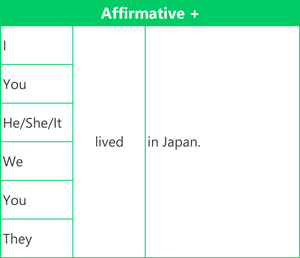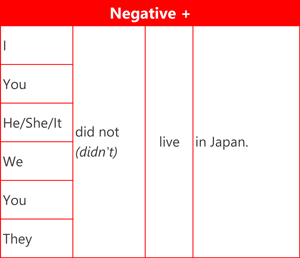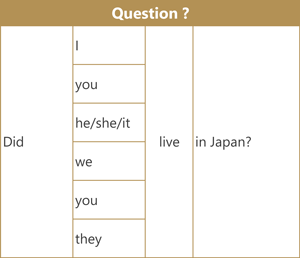What is the past simple?
The past simple (or simple past) is one of the English verb tenses.
You can learn more English online by visiting our free English grammar lessons, which include other verb tenses and more grammar points.
You can also find more grammar, vocabulary and communication tasks for each English level:
Use & examples |
We use the past simple tense to describe:

(1) Past events
[English level A1 - English level A2]
It is used for both short actions and longer situations which happened in the past.
- I ate an apple.
- I lived in Japan.

(2) Past habits
[English level A2 - English level B1]
It is also used for repeated actions which happened many times in the past.
- I took the train at 7 o'clock every morning.
- I played football every weekend.

(3) Past states
[English level A2 - English level B1]
This describes something in the past that was not an action (e.g. emotions, thoughts, relationships, senses).
- He felt tired yesterday afternoon.

(4) Hypothetical situations in present or future
For more information, see conditionals.
- If I had the money, I would buy a big house.

(5) Polite questions and requests in the present
[English level B1 - English level B2]
For more information, see Making requests.
- Did you want to talk to me?
- Could I borrow your pen, please?
Form |
How do you write and pronounce the past simple?
Form: Key points
- For most regular verbs, add 'ed' to the base form of the verb, which is the infinitive without 'to' .
- You need to learn past form of irregular verbs (e.g. eat, ate)
Here are examples of the positive form, negative form and question form using the verb 'live'.


Contractions
didn't = did not

Short answers
Yes, I did. / No, I didn't.
Pronunciation
The past simple with 'ed' has three different pronunciation sounds.
- /t/ (e.g. worked, helped) - when 'ed' comes after an unvoiced consonant sound.
- /d/ (e.g. stayed, lived) - when 'ed' comes after a voiced consonant or a vowel sound.
- /ɪd/ (e.g. started, decided) - when 'ed' comes after the sounds /t/ and /d/.
Notes |
Spelling for verbs
Sometimes we need to remove a letter, and other times we need to add another letter. Here are the exceptions:
1) Most regular verbs
Add 'ed' to the base form.
Examples:
[work] He worked in Japan.
[visit] She visited friends in London.
2) Verbs ending in 'e'
Add 'd' to the base form.
Examples:
[live] She lived in France for a year.
[like] We liked the food at their wedding.
3) Verb ends with consonant + one stressed vowel + one consonant
Double the final consonant and add 'ed'.
Examples:
[stop] I stopped the car.
[plan] We planned a holiday in Italy.
* Verbs ending with an unstressed vowel
These follow the normal rules, and the last consonant is not doubled.
Examples:
[develop] They developed a new company.
3) Verb ends in 'l' (British English)
Double the final consonant and add 'ed'.
Examples:
[travel] I travelled with friends.
4) Verb ends with consonant + 'y'
Change 'y' to 'ied'.
Examples:
[study] He studied law for five years.
[cry] They cried during the film.
Compare verbs ending in 'vowel + y':
[play] He played football on Saturday.
5) Verb ends with 'ic'
Add 'k' before 'ed'.
Examples:
[panic] He's panicking about the exam.
6) Irregular verbs
The past simple form of irregular verbs need to be learned and remembered!
Examples:
[be] I was a student./You were my teacher.
[eat] We ate pizza for dinner.
[buy] I bought a new car.
Quizzes |
Quiz 1: Past events, habits and states.
Type the verbs in the past simple tense and use the affirmative, negative or question form.